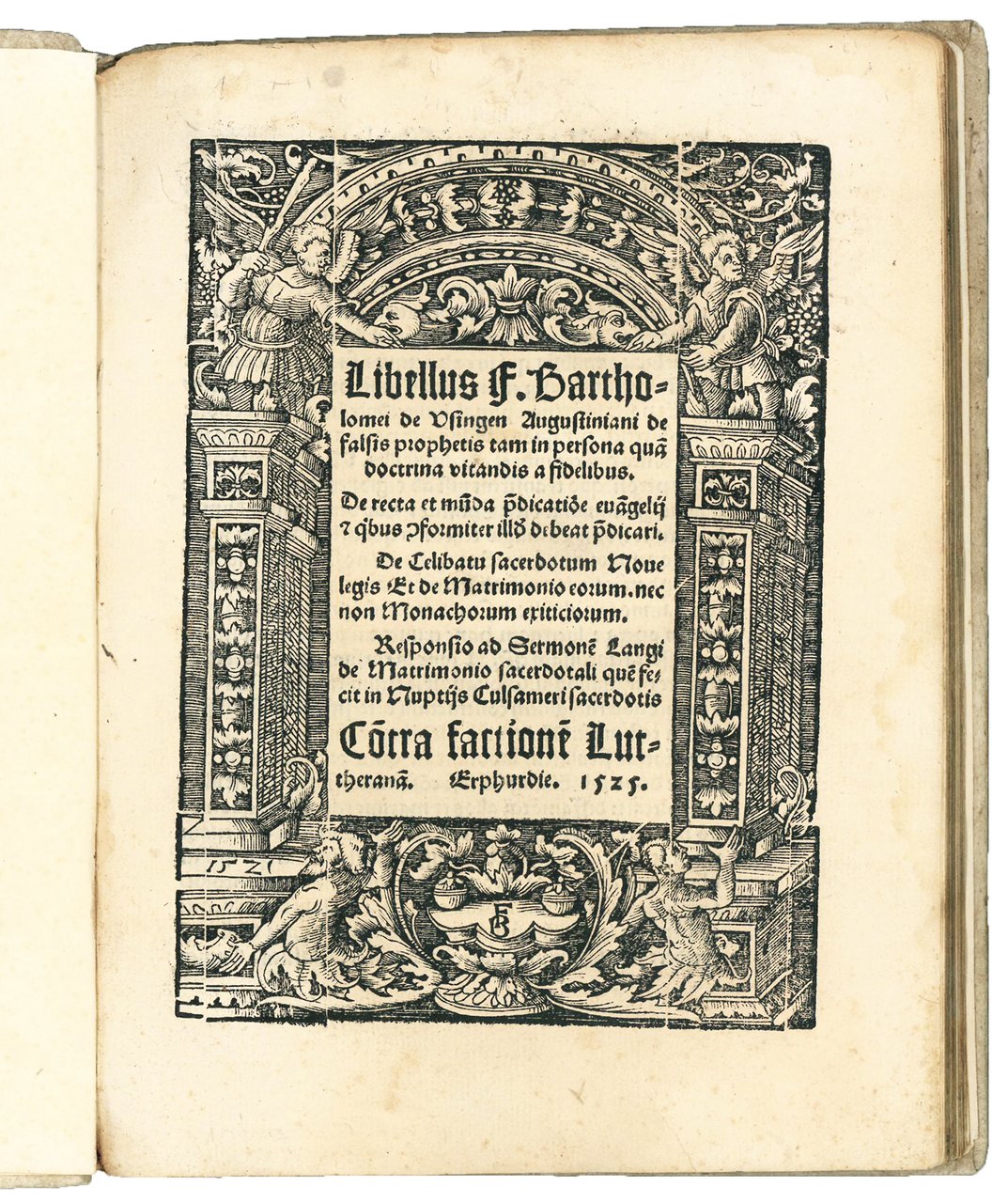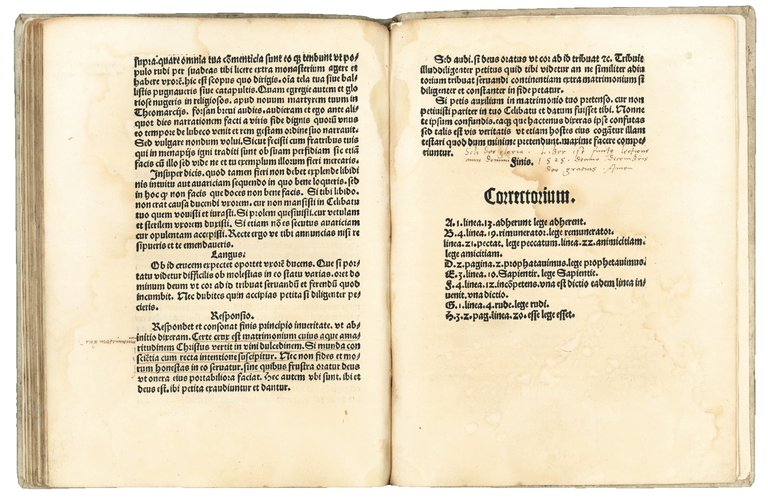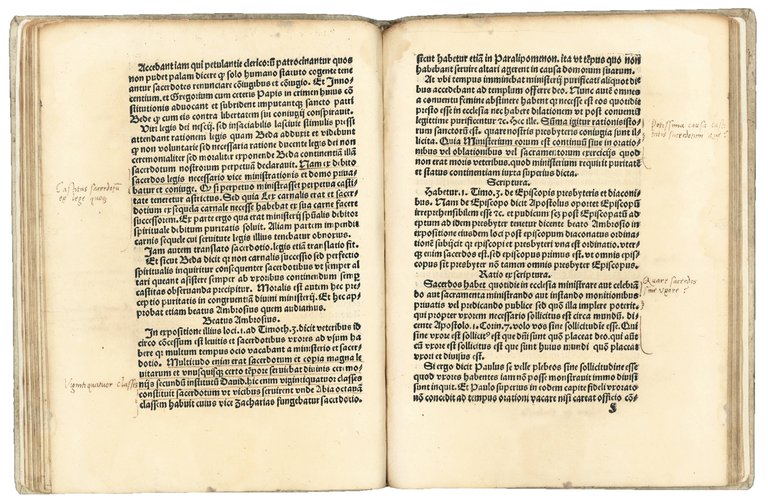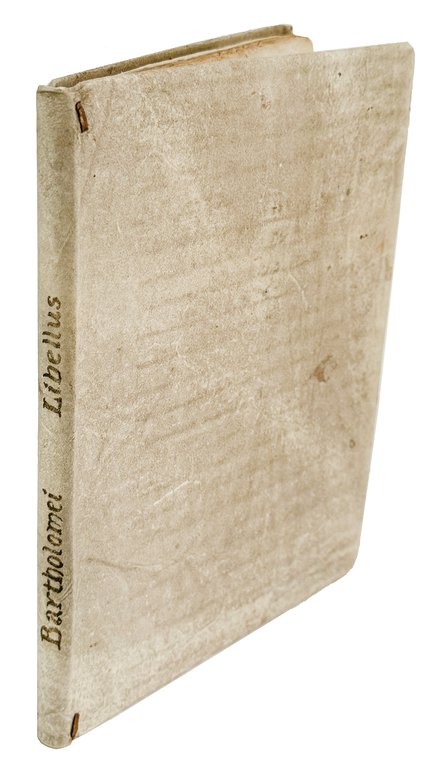



Rare and modern books
ARNOLDI DE USINGEN, Bartholomäus (1465-1532)
Libellus F. Bartholomei de Usingen Augustiniani de falsis prophetis tam in persona qua[m] doctrina vitandis a fidelibus. De recta et mu[n]da p[re]dicatio[n]e eva[n]gelij et q[ui]bus [con]formiter illud debeat p[re]dicari. De Celibatu sacerdotum Nove legis et de Matrimonio eorum nec non Monachorum exiticiorum. Responsio ad Sermone[m] Langi de Matrimonio sacerdotali que[m] fecit in Nuptijs Culsameri sacerdotis. Co[n]tra factione[m] Luttherana[m]
[Matthes Maler], 1525
750.00 €
Govi Libreria Antiquaria
(Modena, Italy)
The correct shipping costs are calculated once the shipping address is entered during order creation. One or more delivery methods are available at the Seller's own discretion: Standard, Express, Economy, In-store pick-up.
Bookshop shipping conditions:
For items priced over €300, it is possible to request an instalment plan from Maremagnum. Payment can be made with Carta del Docente, Carta della cultura giovani e del merito, Public Administration.
Delivery time is estimated according to the shipping time of the bookshop and the courier. In case of customs detention, delivery delays may occur. Any customs duties are charged to the recipient.
For more infoPayment methods
- PayPal
- Credit card
- Bank transfer
-
-
Find out how to use
your Carta del Docente -
Find out how to use
your Carta della cultura giovani e del merito
Details
Description
First edition of this pamphlet attacking Luther's position on the marriage of priests and other reforms proposed by him and his followers. In particular, Arnoldi, who went from being one of Luther's teachers in Erfurt to becoming one of his fiercest opponents, responds to a book on the celibacy of the clergy by the Lutheran theologian Johannes Lang (1487-1548).
Bartholomäus Arnoldi (also called Usingen after his birthplace) began his studies at the University of Erfurt in 1484. He became a Bachelor of Arts in 1486 and Master of Arts in 1491. He taught philosophy at Erfurt University for twenty-four years. In 1498, he became a member of the council of the faculty of arts and afterwards was active in several official positions. From 1501 to 1505, he was one of Luther's teachers in philosophy. During 1504 he was dean of the faculty and joined the Augustinian hermits in 1512. Two years later he was promoted Doctor of Theology and became actively involved in the German Counter Reformation and in particular opposed the Wittenberg reformers. In 1522, he became archdeacon. During the Peasant's War in 1525 he was forced to leave Erfurt and ended up in Würzburg, where he stayed at the local Augustinian monastery. During his last years, Arnoldi followed the local bishop, Konrad von Thüngen, in visitations to the monasteries and in the struggle with growing Protestantism. He appeared with him in the Diet of Augsburg, 1530, where he was appointed as a member of the commission to examine the Augsburg Confession and where he contributed to the writing of the Catholic Response. He died in Würzburg in 1532.
As a philosopher, Arnoldi belonged to the ‘via moderna' school, as did all his colleagues at the Faculty of Philosophy in Erfurt. The ‘via moderna' was born in opposition to the ‘via antiquata' school. The ‘via antiquata' was followed in some universities (as the University of Leipzig) and tended to base their teaching exclusively on a particular tradition, following the method of authors such as Aquinas and Scotus and ignoring some of the more recent authors. Indeed, the philosophers and theologians who represented the ‘via moderna' method were committed to respecting other authoritative writers and to adopting some key doctrines. These authorities included, above all, Jean Buridan and William of Ockham, but also authors such as Gregory of Rimini, Peter of Ailly and Gabriel Biel. These doctrines included the use of the principle of parsimony, a moderately nominalist view of universals, and the denial of a real distinction between the powers of the soul as well as between the entities denoted by the Aristotelian categories other than substance and quality. This school opposition appears clear when we note that in the same year, 1499, two short treatises on natural philosophy were published, both written as commentaries on the same text by Peter of Dresden, the Parvulus philosophiae naturalis: one from Erfurt written by Arnoldi and the other by Johannes Peyligk, a Thomist philosopher from the University of Leipzig (cf. R. Bäumer, Bartholomäus von Usingen OESA, in: “Katholische Theologen der Reformationszeit”, 1985, vol. II, pp. 27-37).
Johannes Lang studied in Erfurt from 1500 and entered the Augustinian monastery there in 1506 (shortly after Luther). In 1511, he went with Luther to Wittenberg, where he received his Master of Arts degree in 1512 and his Bachelor of Biblical Studies degree in 1515. In 1516, Luther appointed him prior of the Augustinian monastery in Erfurt. Lang accompanied Luther

